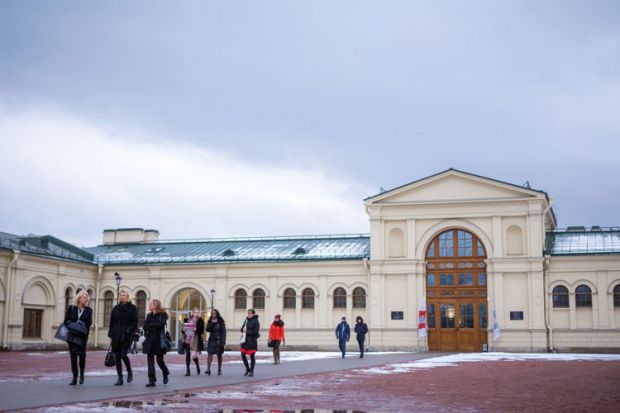The new campus for Saint Petersburg State University’s Graduate School of Management (GSOM) proves quite an effective exemplar of Russian higher education today.
Mikhailovskaya Dacha, the site of the summer residence of Grand Duke Mikhail Romanov, was given to the school as part of the Russian government’s 2005 National Priority Project in Education, aimed at creating two leading business schools in Russia.
The journey to the finished campus, which opened in September, has involved renovation, reconstruction and the construction of new buildings. There have also been visits from Vladimir Putin, the Russian president. The main academic building – formerly Mikhailovskaya Dacha’s stables – is an imposing, expansive teaching space that can house more than 2,100 students.
“We want to be internationally recognised, not just in the academic community but in the broadest sense. That’s our goal, and I think pretty much the same goal [for] the university and many other universities. That’s the Russian direction,” said Konstantin Krotov, managing director of GSOM. He spoke to Times Higher Education at the campus following a breakout session of the Global Alliance in Management Education (CEMS), held in St Petersburg on 25-29 November.
Russia’s higher education sector as a whole is very much in the process of renovation. It has been only a couple of years since the introduction of Project 5-100, intended to propel least five Russian universities to the top 100 of leading global university rankings by 2020. Professor Krotov said the initiative has helped a sector that “had not been developed for the past 15-20 years”.
“I’ve been in a couple of universities as a guest speaker [talking about] our experience,” he said. “They’re doing an amazing job right now. They develop so fast, they’re now much higher in the rankings. Peter the Great St Petersburg Polytechnic University is doing an amazing job. The Ural Federal University and others, many of them are doing a really great job. The development in rankings is just a small piece because they’ve really changed their system.”
His effusive praise is not without validity. When THE published its BRICS & Emerging Economies Rankings 2016 on 2 December, Russia was shown to be a star performer, with 15 institutions in the top 200 and seven in the top 50. Professor Krotov emphasises that Russian universities’ mission isn’t just about their global position; institutions are well integrated with their own communities.
“We integrated a lot with the business community, and the government. For example, our minister of transport [Maxim Sokolov] is head of [GSOM’s] public administration department. He comes from time to time [to teach]. Sergey Ivanov, chief of staff of the presidential executive office [and former defence minister], is chairman of our advisory board.”
Since some believe that President Putin introduced support programmes for Russia’s universities because of the threat of a politicised student body, does he ever worry about government interference?
“No, no. We have academic freedom over here. We have these people on our academic staff not because they’re ministers but because they’re professionals in their fields. For example, the minister for transport became head of department first and then minister for transport. It’s because he’s a professional in his area. We were lucky to have him.
“The advisory board that Sergey Ivanov is chairing just look at what we do, and if it’s OK they just say: ‘go for more.’ They give very good [advice] in terms of direction; [our success] over the past few years is also because of their support and help.”
And yet recent government actions have made Russia’s position in the global academy problematic. At the BRICS rankings launch, Anatoly Oleksiyenko, associate professor in the division of policy, administration and social sciences education at the University of Hong Kong, said Russia’s internationalisation efforts had been “compromised” by its “confrontational policies on the global political arena”.
“It’s hard for me to talk about [Russia’s position] in global higher education, but a lot of [attitudes] will be connected to our geopolitical situation,” Professor Krotov said. “To be a leader in education, you should be open, transparent, attractive. Students come to places that are attractive, safe.”
He added that the situation is not as clear cut as Professor Oleksiyenko suggested, and that the country suffers from a number of misconceptions. “The stereotype is that [Russia] is not safe, which affects the flow [of international students]. You can see here it’s absolutely safe. It’s the wrong stereotype definitely.”
Consequently, he said, his goal is to increase the school’s international focus, and added that this is the case for other universities and not just business schools.
“We want [the international student body] to be larger and I know that other universities want it to be larger,” he said. “We have quite a few students from all over the world. In total, it’s not many, but we’re developing this every year.
“[Also] international professors bring diversity for our community. They bring their research culture, experience, and our own professors become more experienced.”
POSTSCRIPT:
Print headline: Forget the stereotypes: Russia is ‘absolutely safe’
Register to continue
Why register?
- Registration is free and only takes a moment
- Once registered, you can read 3 articles a month
- Sign up for our newsletter
Subscribe
Or subscribe for unlimited access to:
- Unlimited access to news, views, insights & reviews
- Digital editions
- Digital access to THE’s university and college rankings analysis
Already registered or a current subscriber? Login










